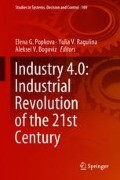Abstract
The purpose of this chapter is to determine fundamental differences of transition to Industry 4.0 from previous industrial revolutions. The methodology includes structural & functional analysis, comparative analysis, induction, deduction, formalization, etc. These methods are used for determining similarities with previous industrial revolutions and peculiarities of the future Fourth Industrial Revolution. The authors prove that transition to Industry 4.0 is a new industrial revolution, which is shown by the attributes that are a sign of all industrial revolutions: change of the type of technological mode as a result of mass implementation of accumulated industrial innovations and systemic transformations in industry, which results in deep changes in logistics and manufactured products. At the same time, the Fourth Industrial Revolution is unprecedented and possesses a whole range of peculiarities, as compared to previous industrial revolutions. It envisages full elimination of human from the production system, ensuring absolute automatization of the production process, simultaneous combination of formation of global industrial networks with elimination of negative social consequences, changes the essence of industrial patents, and creates a possibility for quick change of direction of industrial production’s specialization.
Access this chapter
Tax calculation will be finalised at checkout
Purchases are for personal use only
References
Agamuthu, P. (2017). The 4th industrial revolution and waste management. Waste Management and Research, 35(10), 997–998.
Bogdanova, S. V., Kozel, I. V., Ermolina, L. V., & Litvinova, T. N. (2016). Management of small innovational enterprise under the conditions of global competition: Possibilities and threats. European Research Studies Journal, 19(2 Special Issue), 268–275.
Bogoviz, A. V., Ragulina, Y. V., & Kutukova, E. S. (2017). Ways to improve the economic efficiency of investment policy and their economic justification. International Journal of Applied Business and Economic Research, 15(11), 275–285.
Caruso, L. (2017). Digital innovation and the fourth the industrial revolution: Epochal social changes? AI and Society, 1–14.
Huberman, M., Meissner, C. M., & Oosterlinck, K. (2017). Technology and geography in the second the industrial revolution: New evidence from the margins of trade. Journal of Economic History, 77(1), 39–89.
Khan, B. Z. (2017). Human capital, knowledge and economic development: Evidence from the British the industrial revolution, 1750–1930. Cliometrica, 1–29.
Kitsios, A., Bousakas, K., Salame, T., … , Charles, J.-P. (2017). Renewable energy sources, the internet of things and the third the industrial revolution: Smart grid and contemporary information and communication technologies. In AIP Conference Proceedings, 1814, 020070.
Kostikova, A. V., Tereliansky, P. V., Shuvaev, A. V., Parakhina, V. N., & Timoshenko, P. N. (2016). Expert fuzzy modeling of dynamic properties of complex systems. ARPN Journal of Engineering and Applied Sciences, 11(17), 10601–10608.
Kuznetsov, S. Y., Tereliansky, P. V., Shuvaev, A. V., Natsubize, A. S., & Vasilyev, I. A. (2016). Analysis of innovate solutions based on combinatorial approaches. ARPN Journal of Engineering and Applied Sciences, 11(17), 10222–10230.
Li, G., Hou, Y., & Wu, A. (2017). Fourth the industrial revolution: Technological drivers, impacts and coping methods. Chinese Geographical Science, 27(4), 626–637.
Pirvu, B. C., & Zamfirescu, C. B. (2017). Smart factory in the context of 4th the industrial revolution: Challenges and opportunities for Romania. In IOP Conference Series Materials Science and Engineering, 227(1), 012094.
Popova, L. V., Popkova, E. G., Dubova, Y. I., Natsubidze, A. S., & Litvinova, T. N. (2016). Financial mechanisms of nanotechnology development in developing countries. Journal of Applied Economic Sciences, 11(4), 584–590.
Ragulina, Y. V., Stroiteleva, E. V., & Miller, A. I. (2015). Modeling of integration processes in the business structures. Modern Applied Science, 9(3), 145–158.
Simonova, E. V., Lyapina, I. R. Kovanova, E. S., Sibirskaya, E.V. (2017). Characteristics of interaction between small innovational and large business for the purpose of increase of their competitiveness. In Russia and the European Union development and perspectives (pp. 407–415).
Thayer, P. (2017). Enabling the fourth the industrial revolution (4IR) and the role of NDE and monitoring. Insight: Non-Destructive Testing and Condition Monitoring, 59(9), 469–472.
Acknowledgements
This study was funded by RFBR according to the research project No. 18-010-00103 A.
Author information
Authors and Affiliations
Corresponding author
Editor information
Editors and Affiliations
Rights and permissions
Copyright information
© 2019 Springer International Publishing AG, part of Springer Nature
About this chapter
Cite this chapter
Popkova, E.G., Ragulina, Y.V., Bogoviz, A.V. (2019). Fundamental Differences of Transition to Industry 4.0 from Previous Industrial Revolutions. In: Popkova, E., Ragulina, Y., Bogoviz, A. (eds) Industry 4.0: Industrial Revolution of the 21st Century. Studies in Systems, Decision and Control, vol 169. Springer, Cham. https://doi.org/10.1007/978-3-319-94310-7_3
Download citation
DOI: https://doi.org/10.1007/978-3-319-94310-7_3
Published:
Publisher Name: Springer, Cham
Print ISBN: 978-3-319-94309-1
Online ISBN: 978-3-319-94310-7
eBook Packages: Intelligent Technologies and RoboticsIntelligent Technologies and Robotics (R0)

